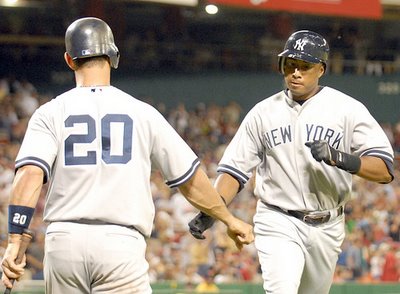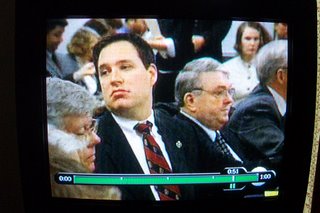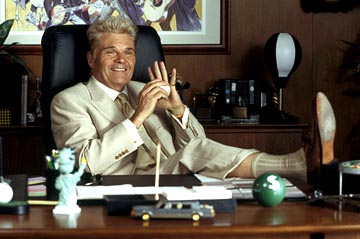There was a bit of an unhappy confluence of events - today, as I was getting ready to send in my annual donation to Fieldston, I got an e-mail from two of my classmates letting me know that Bill Bertsche, Fieldston's Middle School Principal had passed away. Bill started at Fieldston while we were students there, and was a young man, things that give me pause.
Anyhow, after sending in my donation, I was looking at the Fieldston website and noticed that they've put past Founders' Day speeches online. For the uninitiated, every year Fieldston celebrates its founding with a half-day event down at the Midtown Society for Ethical Culture building (which was used for the interior "trial" shots in "Scent of a Woman" starring Al Pacino) - the head of the Society speaks, Fieldston's Principal speaks, there's a keynote, and then the outgoing and incoming student government presidents speak.
As you can imagine, being Fieldston, the student speeches are generally very good - and one in particular really stood out. They don't have the speeches from 2006 up yet, but last year, outgoing president and senior, Ryan Dieringer, gave a self-reflective speech on discovering his own capacity to be a critic (or, more accurately, how a close friend helped him discover it). As someone whose own political philosophies didn't quite jibe with the majority at Fieldston, often, I found great kinship with his sentiments (the entire roster of speeches can be found here:
http://www.ecfs.org/forms/foundersday/foundersday_2005.pdf )
The wonderful thing about the mornings in this room is they call to mind not
just a few of the more poignant memories of what has occurred here in the
past, but a whole history of Founder’s Days stacked neatly on top of each
other. We get to check in on a parade of our younger selves. Evaluate how
we’ve grown, who we’ve become, and how Fieldston and its Founder has
been a part of that.
To preface my remarks today, I’d like to sift to the bottom of the stack, to the
days when I was a sprightly youth fresh from The Elisabeth Morrow School,
and just beginning to adjust to life at Fieldston. I arrived an avid reader with
a Salingeresque older brother who would stack my shelves with books like
The Communist Manifesto and On the Road. I would come in every few
weeks with a new book and preach the word of Socialism, the Beats, Islam or
whatever the day called for, usually to my best friend, Ben Ehrlich. One day
Ben decided to respond honestly to my musings and said something to me
that changed my life.
“Dude, you believe everything you read.”
Ben taught me then what would emerge as the central theme of my education
at Fieldston: the evolution of a critical mind.
It is this very lesson that a 13-year- old Ben Ehrlich taught me that I believe
to be not only the highest calling of the Ethical Culture Fieldston School, but
its greatest strength. The ability to criticize: not only literature, but the world,
one’s community, and ultimately oneself is that which I respect most deeply
in Fieldston’s students, and the subject I wish to speak about this morning.
What makes Fieldston such an inspiring place is that it is full of critics. When
I use this word, criticism, I mean it in its purest, most innocent form: to call
into question everything around you, and to seek with all your powers of
curiosity the discernable truths that exist in our world.
A critique, in this sense, of your community is the noblest of considerations,
and what makes the Fieldston community so strong. Fieldston, like the rest
of the world, is not without its flaws. It rightfully warrants the whole gamut
of criticisms. However, today I am not going to point out the flaws that exist,
but rather celebrate how acutely aware the student body is of them.
It seems that recently, given perhaps the changing face of our school, Fieldston
students have awoken to an age of question. In my time at Fieldston I have
never seen such an outpouring of skepticism about our progressive creed,
commitment to diversity and tolerance, whatever it is, wherever we err short
of perfection, there are some Fieldston students that are ready to let their
community know about it. I think to the multicultural club, SUME’s, inspiring
work on a documentary shown on Martin Luther King Jr. Day assessing and
critiquing the status of diversity in our school. I think to this year’s PAC
elections, and the fiery poise with which candidates stood in front of their
school and laid out their qualms with the status of administrative
communication, a faltering commitment towards progressivism, lack of proper
venues for community service. And, lastly, I think to Lorenzo Krakowsky
and a group of students’ brilliant work on this year’s MAD on progressive
education, when the entire student body came together as one to assess the
goals and weaknesses of our school’s mission.
From where do Fieldston students draw such a capacity for criticism, such
awareness of their community? In the outstandingly progressive classrooms
at Fieldston. Ironic, being as though this very thing, progressivism, is that
which seems to be receiving the brunt of our criticism lately. It begins in
David Swartwout’s classroom, where any critique of world affairs is always
coupled with a personal reflection on ones own relative privilege and prejudice.
It begins in Bob Montera’s classroom, where his course on African Studies is
directed not merely as a seminar on the history of a continent but more
importantly as an unveiling of our own biases against a people. Furthermore,
it begins in this room, where Felix Adler once stood and preached to his
students, “I do not ask you to accept my religion, I ask you to consider the
practical directions for the conduct of life which follow from it, and if, having
tested them, you find them valid in your experience, then they will be of use
to you.” It is precisely this man’s legacy, therefore, that I wish to honor today.
The real issue is whether or not we make our criticisms personally livable;
whether or not we can apply the ethical truths we demand of our community
to how we live. In the Buddhist religion one’s ethical life is broken up into
three parts: view, meditation, and action. The view is one’s vision of the
perfect world, one’s goals for how one attains ethical perfection. This view,
however, is nothing without meditation, a way of harnessing and training the
mind to naturally embody these goals. And most importantly: action, the
incorporation of this learning into everyday life. Felix Adler had a similar
message in mind when he said,
“Deeper, fresher, thinking on the ever lasting problems
[should be] challenged, in order that the conduct, the
doings of men might become nobler. Action without
thinking is blind, thinking without action to test it is
footless…Is what you think as to the meaning of man’s
existence true? The test is: your philosophy: is it
livable?”
Holy is not the ground where people meet to recognize the highest in their
community, but rather where they meet to seek it in themselves.
The highest lesson of Adler’s legacy is self-awareness. To look inside
ourselves and criticize where what we’re doing wrong. It inspires us to make
an effort to personally embody that vision of a perfect community that we see
beneath the surface of our own imperfect one. It teaches us to separate our
true priorities from our illusions. Ultimately, it offers us the most valuable of
skills: to be able to challenge our own egos, live ethically and with love and
compassion for those around us. Without this ability, the otherwise critical
mind is useless to its community, and prey to apathy and pretension. This is
the opportunity Fieldston gives its students; this is the vital challenge that is
issued.
When I walked away from Ben that afternoon, I didn’t feel enlightened by
his comment. I felt angry and confused. But, on this Founders Day, I stand
before you in the spirit of gratitude. Today when you walk out these doors,
may that same gratitude accompany each and every one of you down the
sacred steps of this institution. And wherever those steps lead, be it right
back where they started, or, seniors, those bigger and better places that lie
before us, may we walk deliberately and patiently.
Let us greet the coming world with humility and faith. Let us confront the
rigid walls of our minds and truly embrace the challenge set forth by our
Founder. Let’s come together, bid farewell, and perhaps somehow find an
answer to our questions.
Thank you.
Now’s the day to ask ourselves, “who do we want to be when we return to
this place” and “how will our community have changed as a result?”
------
Just some thoughts for the day. I don't know you, Ryan, but I have to say, "really well done!"
With that in mind, if you're a Fieldston alumnus and you haven't given, do so. The end of the fiscal year is tomorrow.
- Andrew Langer




